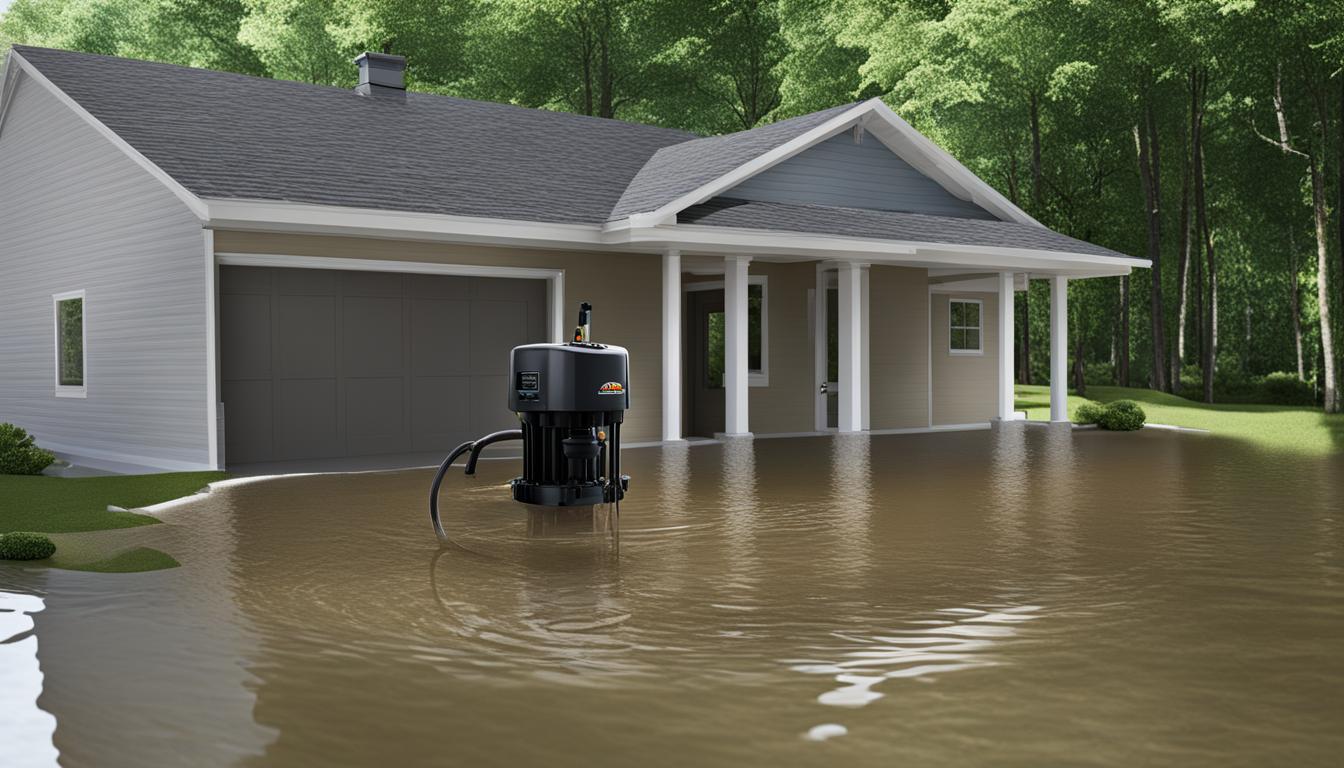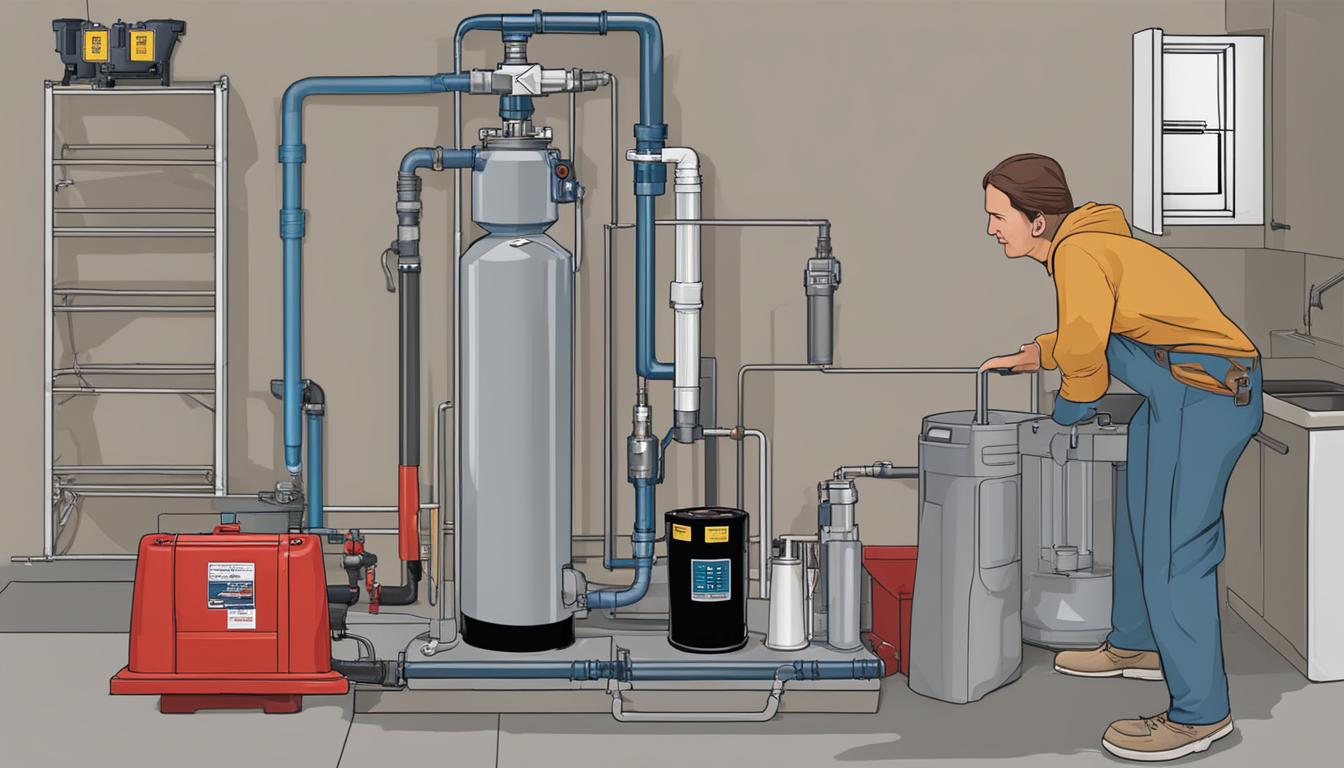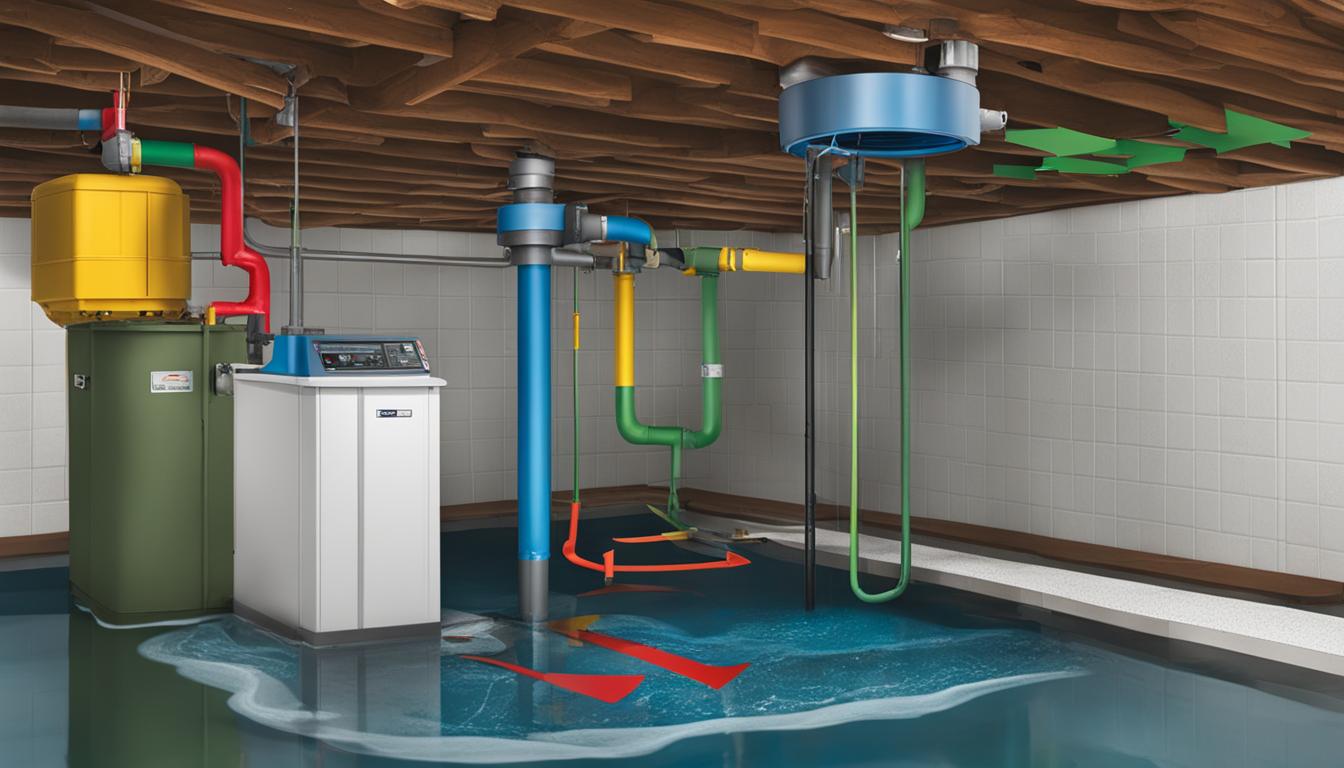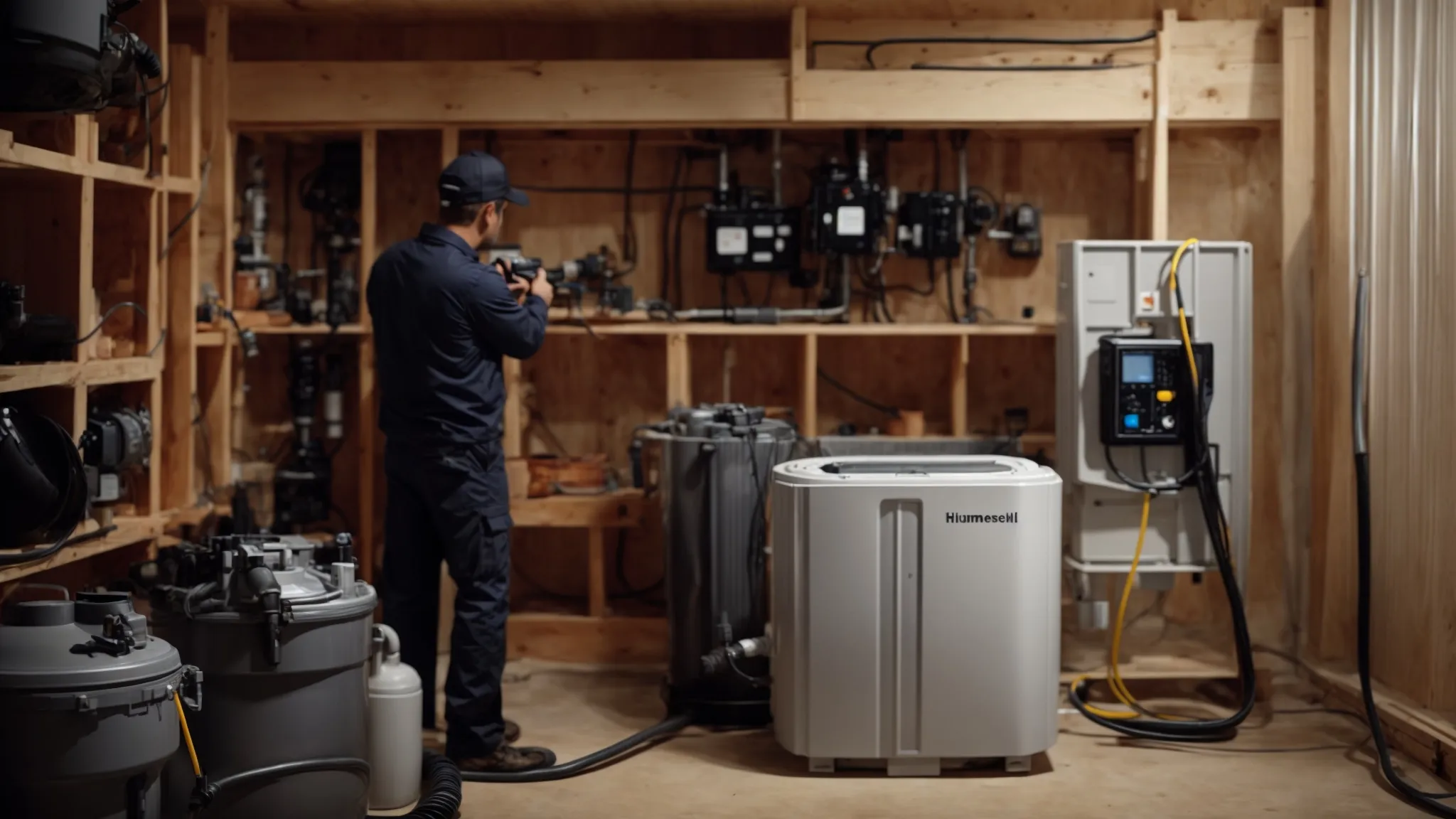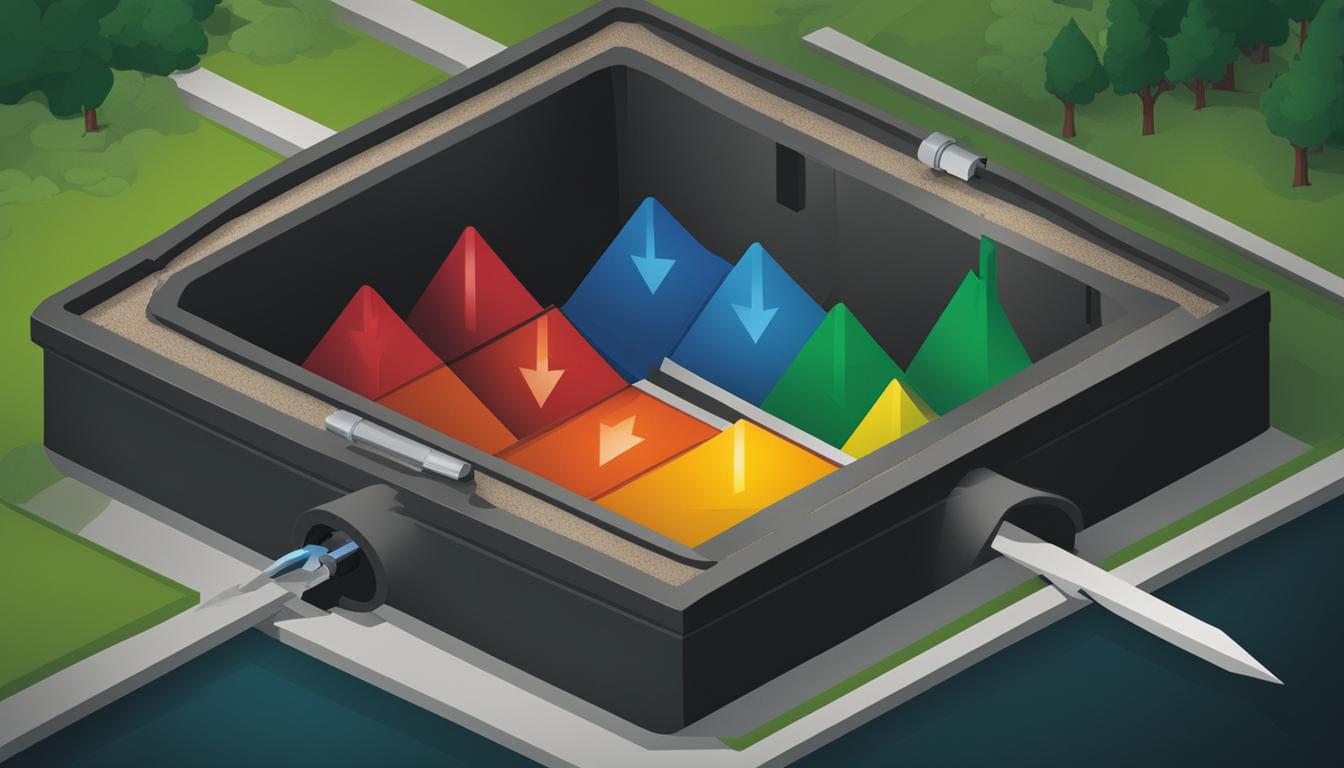Welcome to our comprehensive guide to multi-stage sump pumps. If you’re considering investing in a sump pump for your home, you may have come across the term “multi-stage” and wondered what it meant. Multi-stage sump pumps have several advantages over single-stage pumps, including increased efficiency and more advanced pumping capabilities.
In this guide, we’ll explore the benefits of multi-stage sump pumps, their applications, and provide a cost-benefit analysis to help you determine if they are a worthy investment for your home. Our investment guide will cover key factors to consider, installation and maintenance tips, and case studies of real-life success stories.
Key Takeaways:
- Multi-stage sump pumps offer increased efficiency and more advanced pumping capabilities compared to single-stage pumps.
- A cost-benefit analysis should be conducted before investing in a multi-stage sump pump to determine if it’s a financially sound decision.
- Key factors to consider include pump efficiency, maintenance, and installation requirements.
- Proper installation and maintenance are essential for optimal performance.
- Real-life case studies showcase the effectiveness of multi-stage sump pumps in solving flooding issues and providing basement protection.
Understanding Multi-Stage Pumps
If you’re considering purchasing a multi-stage sump pump, it’s essential to understand the concept of pump stages. In simple terms, pump stages refer to the number of impellers a pump has. An impeller is a rotating component of a pump that accelerates fluid and creates pressure.
Multi-stage pumps have multiple impellers and use them to generate higher pressure, allowing them to move fluid more efficiently and push it through greater distances. Single-stage pumps, on the other hand, have only one impeller and are typically less efficient.
High-efficiency is a significant advantage of multi-stage pumps. They can move more water per unit of energy consumed, making them ideal for applications where energy consumption is a concern.
Advantages of High-Efficiency Multi-Stage Pumps
As mentioned, high-efficiency is a significant advantage of multi-stage pumps. They consume less energy and cost less to operate than single-stage pumps. Other advantages of high-efficiency multi-stage pumps include:
- Increased reliability and durability
- Improved flow stability
- Reduced wear and tear
- Lower noise levels
Multi-Stage Pump Applications
Multi-stage pumps are suitable for a wide range of applications, including:
- Water supply systems
- Industrial and commercial processes
- Agricultural irrigation
- Wastewater treatment
- Oil and gas production
- Marine and offshore operations
The Function of Multi-Stage Sump Pumps
When it comes to sump pumps, their primary function is to keep basements dry by removing excess water. Multi-stage sump pumps use their multiple impellers to move water more efficiently and quickly push it through pipes away from your home. They are ideal for homes in areas with high water tables or frequently experience flooding issues.
Now that we have a clear understanding of multi-stage pumps and their advantages, let’s examine the benefits of multi-stage sump pumps in the next section.
The Benefits of Multi-Stage Sump Pumps
When it comes to protecting your home from water damage, multi-stage sump pumps are an effective solution. Here are some of the benefits of incorporating them into your water management system:
Flooding Solutions
Multi-stage sump pumps are designed to handle large volumes of water efficiently, making them an ideal solution for flood-prone areas. They can quickly pump out water from your basement or other areas of your home, preventing extensive water damage and minimizing the risk of mold and mildew growth.
Basement Protection
Basements are particularly vulnerable to water damage, which can lead to costly repairs and health hazards. Multi-stage sump pumps provide reliable protection by constantly monitoring and removing excess water from your basement, keeping it dry and safe for your family.
Effective Water Management
Multi-stage sump pumps are not only reactive but also proactive, as they help manage your water supply effectively. By automatically regulating the amount of water in your sump pit, they prevent overflow and flooding, minimizing the risk of property damage.
Overall, incorporating a multi-stage sump pump into your water management system is a smart investment that can save you from costly repairs and protect your property from water damage.
Applications of Multi-Stage Sump Pumps
Multi-stage sump pumps have a wide range of applications. Whether you need advanced pumping solutions for your residence or commercial space, these pumps can effectively manage water and prevent flooding. Here are some of the common applications of multi-stage sump pumps:
| Application | Description |
|---|---|
| Residential Homes | Multi-stage sump pumps are ideal for homes with basements prone to flooding. They can effectively manage water and protect your property from water damage. |
| Commercial Spaces | Commercial spaces such as factories, offices, and hospitals require efficient water management. Multi-stage sump pumps provide advanced pumping solutions that can handle the volume of water in these spaces. |
| Municipalities | Multi-stage sump pumps are often employed by municipalities to manage water in large areas such as parks, sports fields, and public spaces. |
| Farms | Multi-stage sump pumps are used in agriculture to provide water management solutions for irrigation, livestock, and crop cultivation. |
Overall, multi-stage sump pumps are a versatile solution for advanced pumping and water management needs. Whether you need to protect your basement from flooding or manage water in a large commercial space, these pumps offer an effective and reliable solution.
Assessing the Cost-Benefit Ratio
As with any investment, it’s essential to evaluate the cost-benefit ratio before making a decision. Multi-stage sump pumps may come with a higher price tag than single-stage pumps, but their benefits may outweigh the initial investment in the long run.
When considering the return on investment of a multi-stage sump pump, it’s important to factor in their effectiveness in mitigating flooding issues, protecting your basement from water damage, and contributing to efficient water management. These benefits can save you significant costs in repair and restoration expenses down the line.
Additionally, high-efficiency multi-stage pumps can contribute to lower energy bills due to their improved performance and reduced energy consumption. This factor should also be considered when evaluating the long-term financial impact of purchasing a multi-stage sump pump.
| Cost-Benefit Analysis of Multi-Stage Sump Pumps | |
|---|---|
| Costs | Benefits |
| – Higher initial investment | – Effective in mitigating flooding |
| – Professional installation may be required | – Protects basement from water damage |
| – Regular maintenance required | – Contributes to efficient water management |
| – Possible increase in energy bills | – Improved performance and reduced energy consumption |
Overall, a cost-benefit analysis of multi-stage sump pumps reveals that their benefits far outweigh their costs. Their potential to save you from costly repairs and provide long-term benefits in water management and energy consumption make them a wise investment choice.
Key Factors to Consider
Before investing in a multi-stage sump pump, there are several key factors to consider. We’ve compiled an investment guide to help you navigate these important considerations:
| Factor | Importance |
|---|---|
| Pump Efficiency | The efficiency of the pump plays a significant role in determining the overall effectiveness of the sump pump system. High-efficiency pumps are recommended for maximum performance and energy efficiency. |
| Maintenance | Proper maintenance is crucial to ensure that the pump operates efficiently and effectively. It’s important to follow the manufacturer’s guidelines for maintaining the sump pump system to prevent malfunctions and prolong the lifespan of the pump. |
| Installation Requirements | Installation requirements vary depending on the type of pump system, so it’s important to consider the installation process and any associated costs before making a decision. Some systems may require professional installation, while others can be installed by homeowners with some plumbing experience. |
Considering these key factors will help you make an informed decision and choose the best multi-stage sump pump for your home. It’s important to weigh the benefits and costs carefully and determine if the investment is worth it in terms of future savings and protection against basement flooding and water damage.
Installation and Maintenance Tips
Proper installation and maintenance are crucial for the optimal performance of high-efficiency multi-stage sump pumps and effective water management. Here are some expert tips to help you ensure smooth installation and maintenance:
- Choose the right location: When installing your multi-stage pump, it’s crucial to choose the right location. It should be placed in an area where water naturally accumulates and near a power source.
- Check the discharge pipe: Ensure that the discharge pipe is properly sized and free of any obstruction. Inadequate pipe size can lead to pump failure, while obstructions can cause water backups in your home.
- Regular maintenance: Schedule regular maintenance checks at least once a year to ensure your multi-stage sump pump is performing optimally. During maintenance, check for any signs of wear and tear in the pump and replace any worn-out parts immediately.
- Backup power source: Consider investing in a backup power source, such as a battery backup or generator, in case of a power outage. This will ensure your pump continues to function even when there is no power.
By following these installation and maintenance tips, your multi-stage sump pump will provide you with efficient water management, basement protection, and cost-effective flooding solutions for years to come.
Comparing Multi-Stage Pumps to Single-Stage Pumps
When it comes to choosing a sump pump, two primary options are available: single-stage pumps and multi-stage pumps. Single-stage pumps are known for their simplicity and affordability, while multi-stage pumps offer more advanced features and higher efficiency.
Single-stage pumps have only one impeller that moves water out of the sump pump pit. Multi-stage pumps, on the other hand, have two or more impellers that work together to move water more efficiently. This difference in design allows multi-stage pumps to pump water faster and more effectively, making them ideal for larger homes, commercial spaces, and areas with high water tables.
The main advantage of multi-stage pumps is their high efficiency. Because they use multiple impellers to move water, they require less energy to operate than single-stage pumps. This efficiency not only saves homeowners money on their energy bills but also reduces their carbon footprint.
While multi-stage pumps come with a higher price tag than single-stage pumps, their efficiency and advanced pumping capabilities can provide significant long-term savings. When considering the cost-benefit ratio, it’s important to evaluate the performance benefits of multi-stage pumps and their potential return on investment, making them a smart choice for those seeking advanced water management solutions.
The Advantages of High-Efficiency Multi-Stage Pumps
High-efficiency multi-stage pumps offer several advantages over other types of pumps. Their advanced design allows them to pump water faster, more efficiently, and with less energy consumption. These pumps are perfect for environments where efficiency is critical, such as residential homes, commercial spaces, and facilities where water management is a top priority.
One of the main advantages of high-efficiency multi-stage pumps is their ability to move water more effectively, which helps to prevent flooding, water damage, and other related issues. Their efficiency also means that they require less energy to operate, making them an environmentally sustainable and cost-effective option in the long run.
Overall, when weighing the benefits of multi-stage pumps against single-stage pumps, the choice comes down to personal preference and specific needs. Single-stage pumps are an economical choice for smaller homes and properties with lower water tables. However, for larger homes, commercial spaces, and areas with high water tables, multi-stage pumps offer superior performance and efficiency, making them a smart investment in the long run.
Case Studies: Real-Life Success Stories
To showcase the effectiveness of multi-stage sump pumps, we present a few real-life case studies. These stories provide a glimpse into how these pumps have provided basement protection, solved flooding issues, and proven their value.
“We had constant issues with water seeping into our basement, damaging our furniture and creating a moldy environment. We decided to invest in a multi-stage sump pump, and it was the best decision we made. The pump never failed us, and our basement has remained dry ever since. We were initially hesitant about the cost, but after performing a cost-benefit analysis, it was clear that the pump was worth the investment.”
– John and Mary, home-owners in Ohio
“We run a daycare center in an old building that frequently experienced flooding. We were concerned about the safety of the children and the damage that could be caused. We decided to install a multi-stage sump pump, and it has been a game-changer. The pump has significantly reduced the risk of flooding, and we have peace of mind knowing we’re providing a safe environment for the kids.”
– Sarah, caretaker in New York
In both cases, these individuals were initially hesitant about the investment cost of multi-stage sump pumps. However, after conducting a thorough cost-benefit analysis and seeing the results firsthand, they realized the value of the investment. These success stories showcase how multi-stage sump pumps can provide basement protection, solve flooding issues, and offer a reliable solution for efficient water management.
Future Innovations and Advancements
At present, multi-stage sump pumps have proven their worth in addressing various water management issues. However, experts predict that advancements in pump technology will bring revolutionary changes to advanced pumping systems.
One area of innovation is in the materials used to construct these pumps. With the development of stronger and more durable materials, pumps can handle higher volumes of water and last longer. Additionally, pumps with built-in sensors and alarms that detect water levels and system malfunctions are becoming increasingly popular and will become more widespread.
| Future Innovations | Benefits |
|---|---|
| Smart pumping technology | Efficient water management and early warning detection |
| Solar-powered pumps | Cost-effective and sustainable energy source |
| Nanotechnology coatings | Increased resistance to corrosion and longer lifespan of materials |
| Wireless connectivity | Remote monitoring and control of pumping systems |
Solar-powered multi-stage sump pumps are another exciting development. These pumps are ideal for areas that experience frequent power outages or when power sources are limited. With solar panels providing an environmentally friendly power source, these pumps are a cost-effective and sustainable solution for water management.
“As technology continues to improve, multi-stage pumps will become more efficient, reliable, and environmentally sustainable.”
Finally, nanotechnology coatings are being developed that enhance the lifespan of pump materials and increase resistance to corrosion. This technology involves applying a protective coating to the pump’s internal components, leading to less maintenance and greater durability.
These are exciting times for the world of advanced pumping and water management. The possibilities for innovation and advancements are endless, ensuring that multi-stage sump pumps will continue to be an essential tool in protecting homes and businesses from unexpected water damage for years to come.
Conclusion
Investing in a multi-stage sump pump can be a smart decision for homeowners looking for effective flooding solutions and basement protection. Throughout our guide, we have thoroughly explored the benefits, applications, and cost-benefit analysis of multi-stage sump pumps, providing valuable information to help you make an informed decision.
When considering the investment, it’s essential to evaluate various factors such as pump efficiency, maintenance requirements, and installation costs. Our investment guide in section six highlighted these crucial factors, enabling you to make a well-informed decision.
Additionally, we compared multi-stage pumps to single-stage pumps in section eight, assisting you in determining which pump best suits your needs. The case studies presented in section nine illustrated how multi-stage sump pumps have provided effective basement protection and proven their value as a sound financial investment.
As technology advances, future innovations and advancements in multi-stage sump pumps offer exciting possibilities for improved water management. We covered these advancements in section ten, providing a glimpse of what’s to come in the world of advanced pumping systems.
In conclusion, we hope that our investment guide, cost-benefit analysis, and insightful information have provided you with the necessary resources to decide if a multi-stage sump pump is right for you and your home. Remember to carefully consider all factors and choose the pump that best meets your needs and budget.
FAQ
Are multi-stage sump pumps suitable for residential homes?
Yes, multi-stage sump pumps are commonly used in residential homes to effectively manage water and protect basements from flooding.
How do multi-stage pumps differ from single-stage pumps?
Multi-stage pumps have multiple impellers or stages, which allow them to generate higher pressure and achieve greater efficiency compared to single-stage pumps.
What are the key benefits of using multi-stage sump pumps?
Multi-stage sump pumps offer several benefits, including efficient water management, reliable basement protection, and effective solutions for addressing flooding issues.
In what applications can multi-stage sump pumps be used?
Multi-stage sump pumps have a wide range of applications, including residential homes, commercial buildings, industrial facilities, and advanced pumping systems for water management.
How do multi-stage sump pumps compare to single-stage pumps in terms of cost and performance?
Multi-stage pumps generally have higher upfront costs but offer superior performance, energy efficiency, and long-term cost savings compared to single-stage pumps.
What factors should I consider before investing in a multi-stage sump pump?
When determining if a multi-stage sump pump is the right choice for your needs, consider factors such as pump efficiency, maintenance requirements, installation considerations, and overall cost-benefit analysis.
Any tips for installing and maintaining multi-stage sump pumps?
To ensure smooth installation and optimal performance, follow manufacturer guidelines, consider professional installation, and perform regular maintenance tasks, such as cleaning the pump and checking for any signs of damage or wear.
Can you provide real-life case studies demonstrating the effectiveness of multi-stage sump pumps?
Certainly! We have several case studies showcasing how multi-stage sump pumps have successfully protected basements, solved flooding issues, and provided cost-effective water management solutions. Please check out our case studies section for more information.
What are the future innovations and advancements expected in multi-stage sump pumps?
As technology evolves, we anticipate advancements in multi-stage sump pumps that will further enhance their efficiency, control systems, and integration with smart technologies for improved water management and overall performance.
In conclusion, are multi-stage sump pumps worth the investment for residential homes?
After a thorough analysis of the benefits, applications, and cost-benefit ratio, multi-stage sump pumps have proven to be a worthwhile investment for residential homes, offering reliable basement protection, efficient water management, and long-term cost savings.
